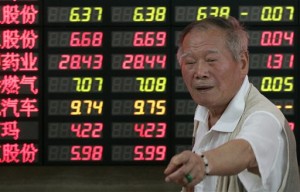
An investor gestures in front of the stock price monitor at a private securities company Tuesday, July 24, 2012, in Shanghai, China. Asian stock markets mostly dropped Tuesday despite a sign China’s manufacturing is beginning to recover as the possibility of a credit rating downgrade for Germany added to jitters over Europe’s debt turmoil. AP PHOTO
HONG KONG—Asian markets were mixed on Tuesday after a sell-off the previous day, with Europe’s debt woes casting a shadow but relief provided by news of Chinese manufacturing activity hitting a five-month high.
Most bourses reversed earlier losses that were fueled by renewed concerns that the weight of eurozone sovereign debt would force Spain to seek a full state bailout.
However, trade remained cautious after ratings agency Moody’s downgraded its outlook for Germany, delivering a stark warning that not even Europe’s largest and most pivotal economy was immune from the rolling crisis.
Tokyo ended 0.24 percent, or 20.23 points, lower at 8,488.09, but Seoul added 0.25 percent, or 4.49 points, to 1,793.93 and Sydney climbed 0.10 percent, or 4.3 points, to 4,133.2.
Hong Kong, which opened at 1 p.m. (0500 GMT) after a severe typhoon hit the southern Chinese business hub, closed 0.79 percent, or 150.27 points, lower at 18,903.20, while Shanghai advanced 0.24 percent, or 5.19 points, to 2,146.59.
In Europe the focus is now on Spain, which saw its borrowing costs climb on Monday to a level considered unsustainable, sparking fears that the eurozone’s fourth-largest economy may require a bailout.
The yield – the rate of return investors earn – on the benchmark Spanish 10-year government bonds jumped to 7.498 percent from 7.225 percent on Friday, well above the 7.0 percent danger level for long-term funding.
Madrid’s troubles sent global markets spiraling downward on Monday amid fears of another economic downturn.
Adding to the gloom was news that Moody’s revised down its outlook on the sovereign ratings of Germany, the Netherlands and Luxembourg from stable to negative.
On Wall Street the Dow fell 0.79 percent, while European stocks took a pummeling. However, London, Paris and Frankfurt were all in positive territory in early European trade on Tuesday.
Eyes were also on Greece, with auditors from the European Union, International Monetary Fund and the European Central Bank due in Athens this week for another inspection of the new government’s economic program.
The report will determine whether Greece will receive fresh loans of 31.5 billion euros due by September under its debt rescue program.
However, there was a little respite from recent bad news, with banking giant HSBC saying that its Purchasing Managers’ Index (PMI) for China – which measures manufacturing activity – had hit a five-month high in July.
The preliminary figure hit 49.5 this month, well up from the 48.2 recorded in June, which HSBC said indicated that government measures to boost growth in the world’s second-biggest economy, including interest rate cuts, were working.
A PMI reading above 50 indicates expansion, while a reading below 50 indicates contraction, and while the data remained negative, it provided some hope that the country’s manufacturing sector was heading in the right direction.
On currency markets the euro bought $1.2100 and 94.63 yen in European morning trade, down from $1.2137 and 95.13 yen in New York.
However, it was an improvement from Asian trade Monday when it dropped to 94.24 yen, its lowest level since November 2000.
The dollar traded at 78.21 yen, against 78.37 yen on Monday, as the Japanese currency is increasingly seen as a safe-haven unit amid turmoil in Europe and an uncertain US economic recovery.
The swings on the currency markets came as Japan’s Finance Minister Jun Azumi repeated warnings about the yen’s soaring value and hinted at another possible currency market intervention in a bid to tame the unit.
“We will not rule out any measures against excessive moves and will take decisive action when that’s deemed necessary,” he told reporters.
Oil was on the up. New York’s main contract, light sweet crude for September delivery, gained 10 cents to $88.24 a barrel in afternoon trade and Brent North Sea crude for delivery in September was 15 cents higher at $103.41.
Gold was at $1,573.81 at 1040 GMT from $1,571.22 on Monday.
In other markets:
— Singapore climbed 0.53 percent, or 15.95 points, to 2,998.44.
Singapore Telecom gained 0.29 percent to Sg$3.46 and Keppel Corp added 1.18 percent to Sg$11.19.
— Taipei fell 0.29 percent, or 20.38 points, to 7,008.35.
Leading smartphone maker HTC shed 2.26 percent to close at Tw$280.5 while Taiwan Semiconductor Manufacturing Co. was 0.67 percent higher at Tw$74.8.
— Manila closed 0.40 percent, or 20.34 points, higher at 5,159.74.
Ayala Corp. added 1.17 percent to 415 pesos, while unit Ayala Land gained 0.20 percent to 19.94 pesos.
Metropolitan Bank climbed 2.47 percent to 95.30 pesos.
— Wellington eased 0.13 percent, or 4.66 points, to 3,460.70.
Telecom lost 0.6 percent to NZ$2.525, Air New Zealand was up 0.55 percent at NZ$0.91 and Fletcher Building was steady at NZ$5.81.
— Kuala Lumpur eased 0.22 percent, or 3.60 points, to 1,632.57.
Gaming giant Genting Malaysia fell 1.1 percent to 3.46 ringgit, while utility Tenaga Nasional slipped 0.5 percent to 6.69 ringgit. Hong Leong Bank added 0.2 percent to 13.32 ringgit.
— Jakarta fell 0.44 percent, or 17.68 points, to 3,992.11.
Car maker Astra fell 0.8 percent to 6,350 rupiah, Telkom slid 2.2 percent to 8,750 rupiah and nickel and gold miner Antam decreased 2.3 percent to 1,270 rupiah.
— Bangkok rose 0.21 percent, or 2.53 points, to 1,187.64.
Banpu was unchanged at 440 baht, while PTT lost 1.53 percent to 321 baht.
— Mumbai rose 0.24 percent or 40.73 points to 16,918.08.
Hindustan Unilever rose 7.5 percent to a record 476.05 rupees. Software firm Wipro slid 2.93 percent to 346 rupees.

